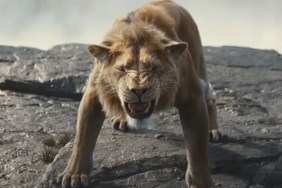
I read about one-third of Jordan Belfort‘s autobiography before deciding I couldn’t take anymore. I only have so much tolerance for a blowhard wearing, with pride, the amount of cocaine and quaaludes he was able to take and the number of hookers he slept with as a badge of honor. Belfort’s book seems to believe we’ll be impressed by his tales of debauchery as much as we’ll feel sorry for and applaud him for coming out the other end after his involvement in stock market manipulation, securities fraud, etc. I’m not impressed, nor do I feel sorry for him and this is what Martin Scorsese‘s The Wolf of Wall Street gets exactly right.
The decision to turn Belfort’s autobiography into a dark comedy is spot on. We should laugh at this man, this morally diseased man so wonderfully captured by Leonardo DiCaprio, delivering a performance filled with off the charts, kinetic energy. The problem the film faces, however, is, outside of an innate ability to work as a salesman, if Belfort isn’t mistreating women, snorting cocaine or sucking down quaaludes he’s not all that interesting. The second act of the film, and into the third, suffers a little as a result.
What you’ll first need to realize is there is nothing redeeming about Jordan Belfort. This isn’t a story of a man who rises to become a corrupt stock broker, learns his lesson in the end and is now a great man. Quite simply, this is not a happy story with a happy ending, so don’t look for a silver lining. In fact, The Wolf of Wall Street is rather grim as it gazes into the glassy-eyed observer, bursting with the desire to get rich quick even if it means making a deal with the devil, or becoming the devil themselves.
Belfort isn’t painted as always having been such a bad guy, but it isn’t long before the influences of life on Wall Street take over. Beginning in the mid-80s, the film introduces us to Belfort, green and off the bus having just arrived in New York with his wife (Cristin Milioti).
In only a short cameo scene, Matthew McConaughey is a chest beating bolt of words and encouragement. His prescription for success on Wall Street involves masturbating twice a day and snorting plenty of cocaine. Easy enough, but Belfort’s stint on Wall Street is short lived. The stock market crash of ’87 sends him hunting for a job, a hunt that results in him finding the world of penny stocks, a discovery that means 50% commission and a whole lot of defrauded clients.
It isn’t long before he decides to take advantage of this unregulated market on his own, ultimately teaming with some childhood friends he can mold into a pit of minions as well as the man that ultimately becomes his #1 co-conspirator, Donnie Azoff. Played by Jonah Hill, Donnie as a toothy ingrate who married his first cousin. Hill’s performance is as unexpected as it is entertaining and I’m convinced half of it is due to the teeth and the other half to Hill becoming a bonafide actor.
As Belfort’s investment firm, Stratton Oakmont, is on the rise he captures the attention of FBI agent Patrick Denham (Kyle Chandler), but his troubles with the law are of secondary concern to Scorsese who ultimately ends up spending probably too much time focusing on Belfort’s bad behavior in a film that probably could have been snipped by about 20 minutes or so and felt a little more fluid. Thankfully, though too long, the level of entertainment is through the roof. Belfort may be an asshole, but his tawdry tales are entertaining.
Speaking of Stratton Oakmont, this isn’t the first time the firm has served as source material for the movies. It served as inspiration for the 2000 film Boiler Room starring Vin Diesel. The love the characters in that film felt for Wall Street‘s Gordon Gekko is clearly felt within the walls of the Wolf narrative and damn near said explicitly as Belfort is profiled in a “Forbes” magazine article as the titular “Wolf of Wall Street”, which eventually sends applications for his firm into the stratosphere. People don’t care how dirty the dealings are, if it means getting rich, they’re in. Director Oliver Stone was always surprised at the response Wall Street received, many looking at Gekko as an idol, Belfort is Wolf‘s Gekko.
Amid the drugs and sex, credit should be given to Margot Robbie as Belfort’s wife Naomi. Wolf of Wall Street features women as props, naked and exposed, and any woman close to Belfort is sure to be treated with the least amount of respect and Robbie’s Naomi bears the brunt of this. She, nevertheless, remains strong-willed and confident and it would be an interesting conversation to consider just how much blame people would place on her shoulders. She doesn’t mind spending the money and knows exactly where it came from and yet doesn’t receive any level of punishment.
Jean Dujardin as a Swiss banker, Rob Reiner as Belfort’s short-fused father, Max, and P.J. Byrne as Nick “Rugrat” Koskoff also add their own particular flair to the narrative that keeps things moving.
Wolf of Wall Street is wall to wall energy, made with the spirit of a filmmaker in his mid-20s, not his early ’70s. Scorsese and cinematographer Rodrigo Prieto (Argo) keep the camera moving, nearly bouncing off the walls with verve and Scorsese’s long-time editor, Thelma Schoonmaker edits the narrative to a beat that can turn on a dime as DiCaprio delivers speeches you’d expect to hear from leaders on the battlefield of some sword and sandal epic. He excites his army of brokers to sell or die.
Don’t look for much in the way of substance from Wolf of Wall Street as it isn’t really saying anything about the world of financial corruption or society’s want for “get rich quick” schemes as much as these are merely obvious facts. Look at it instead as a piece of entertainment with wild performances, bad behavior and a a downright deplorable man at its core. Of course, if you need substance, ask yourself, would you trade your life for the rockstar life Belfort was living? Would you look at what he did and say, “I would be willing to do that, I just wouldn’t take it so far”? Could you promise yourself you wouldn’t take it that far?
Wolf of Wall Street presents moments of opportunity where Belfort could have paid some fines and walked away a rich man. Had he done so, getting away with the things he’d done without as much as a slap on the wrist, would that have made it right?









